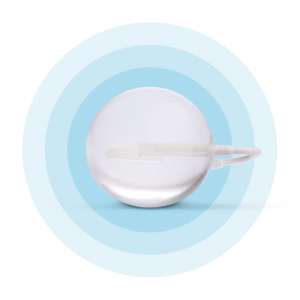Is obesity A Risk Factor For Cancer?
Spatz3 is the world’s only Adjustable Gastric Balloon System
Obesity and cancer have been suspected of having a relationship for some time. While some professionals claim that obesity can cause cancer, others feel that the combination is not as straightforward. There are still some important questions to answer. Can losing weight reduce your cancer risk? What types of cancers are attributed to obesity? Are there safe ways to prevent obesity? Each of these topics warrants closer attention.

Receive your free 4 -step guide today!
In each step, you’ll learn new tips to help you choose the RIGHT weight loss solution!
Can Obesity Cause Cancer?
Obesity and cancer: is there any direct correlation? It is difficult to say with complete certainty that obesity causes cancer. Being that all individuals have a different genetic makeup, some people without any fat on their body could have a genetic predisposition to cancer. However, studies have consistently shown that higher amounts of body fat are linked to higher risks for certain types of cancer.
While the verdict is still out, there are many theories in regard to obesity related cancers. For example, obesity and colorectal cancer may be related due to poor dietary habits. Obesity and lung cancer could be the result of lifestyle choices such as smoking. As many individuals who consume alcohol are overweight, there may be a connection between obesity and pancreatic cancer (as well as liver cancer).
Although it is important to look at the ways to prevent obesity, it is just as wise to understand that obesity is associated with an increased risk of certain cancers. Excess body fat can lead to increased risks for Liver Cancer, Kidney Cancer, Pancreatic Cancer, Breast Cancer, and many others. This brings us to the next point. Let’s examine 13 cancers associated with obesity in order to appreciate the “big” picture.

Obesity Related Cancers
As mentioned previously, it is thought that there are at least 13 cancers associated with obesity. This list illustrates such observations:
- Obesity and colorectal cancer are thought to be related.
- Obesity and breast cancer may share some genetic similarities.
- Obesity and ovarian cancer may occur on occasion.
- Obesity and prostate cancer may be related, as those with a higher body mass index (BMI) are more likely to be diagnosed with prostate issues.
- Those who carry excess weight are more likely to suffer from obesity and endometrial cancer.
Seven additional types of cancer may share a causal relationship with obesity:
- Kidney cancer
- Cancer of the gallbladder
- Uterine corpus cancer
- Thyroid cancer
- Multiple myeloma
- Liver cancer
- Adenocarcinoma of the oesophagus
While these 13 cancers associated with obesity may appear staggering, it is important to remember that the obesity risk factor for cancer is not yet fully understood. Therefore, more research still needs to be performed.
After reading this, you may be asking yourself, what can I do to prevent myself from being at a higher risk for cancer? Let’s dive right in!
The relation between obesity and cancer risk
First, we will briefly discuss the possible explanations behind the connection between obesity and cancer.
Low-level inflammation
People who are obese, or even those with too much excess body fat, oftentimes have low-level inflammation, which in turn can cause DNA damage that leads to cancer. In this regard, those who are obese or overweight have a higher likelihood of experiencing low-level inflammation and are therefore at greater risk of being diagnosed with cancer.
Estrogen and Insulin
Additionally, those who have too much excess fat can be overproducing estrogen, which can be a main cause of breast and ovarian cancer.
Another explanation for increased risk of cancer can be a result of the increased levels of insulin in the blood. Overweight and obese people have increased insulin levels, which can lead to the onset of kidney, colon, and prostate cancer, among others.

Bad Habits
One interesting theory in regard to obesity and cancer involves lifestyle habits. For example, obesity is associated with an increased risk of certain cancers that may involve bad habits such as smoking cigarettes (lung cancer).
Furthermore, another obesity risk factor for cancer may involve a decidedly sedentary lifestyle. As exercise helps to clean toxins from the body, it only stands to reason that little to no physical activity is associated with obesity and cancer risk.
So, we can see that the statement “obesity causes cancer” is hardly definitive. We should rather say that learning the ways to prevent obesity can mitigate the chances of being diagnosed with cancer. This brings us to the next point. What are some of the ways in which you can reduce cancer risk factors?
In fact, during a 2012 study on the effects of obesity in relation to increased risk of cancer, it was discovered that approximately 100,000 cases of cancer in the USA alone were caused by people being overweight or obese. This data isn’t presented to scare anyone, rather to slowly introduce the idea that your health can have drastic effects throughout many aspects of your life.
Can weight loss reduce cancer risk?
Many theories claim that obesity is associated with an increased risk of certain cancers. As we previously mentioned, it is difficult to study the association between obesity and cancer, given that everyone’s genetic makeup is different. However, the data shows that people who gain less weight throughout adulthood are of a lower likelihood to be diagnosed with certain cancers.
On the other hand, studies have been unable to determine if losing weight will lead to a lower risk of cancer, being that a person’s weight loss could be a result of a previous underlying condition. Although, a few studies have been able to determine a link between weight loss and a decreased risk for breast cancer, colon cancer, and prostate cancer.
So, one of the best ways to reduce cancer risk is to begin eating healthy. Consuming fruits, vegetables and foods high in vitamins will obviously provide numerous short- and long-term benefits. This is also when the Spatz3 adjustable gastric balloon can assist.
The most definitive data in regards to lowering one’s risk of cancer comes from observations of people who have received bariatric surgery, also known as weight loss surgery. Studies have shown that people who undergo bariatric surgery, such as the Spatz3 Adjustable Gastric Balloon, have lower risks of cancer compared to those who did not receive weight loss surgery.
Overall, it is clear that losing weight will result in a lower likelihood of being diagnosed with cancer. So, what does the Spatz3 balloon have to do with this?

Combat obesity, a risk factor for cancer, with Spatz3
If you wish to proactively address cancer risk factors while simultaneously losing weight, the Spatz3 gastric balloon is here to help. This balloon will reduce your appetite and when combined with other lifestyle changes, it may even positively impact your obesity risk factor for cancer.
Obesity and cancer represent two of the most common diseases in modern society. The good news is that there are many ways in which you can counter their effects and reduce cancer risk. Always consult with a medical professional and do not hesitate to contact the Spatz3 team to learn more about your options.
The Spatz3 adjustable gastric balloon, the most effective weight loss balloon on the market, is a perfect method to lose your excess body weight. With market-leading success rates and weight loss results, both near double our competitors, the Spatz3 is the obvious choice for those who are interested in losing weight and changing their eating habits.
As a non-surgical weight loss procedure, the Spatz3 provides patients with an opportunity to change their lives without the risks of surgery. Additionally, by working with your balloon to develop long lasting healthy eating habits, you’ll be looking your best long after the balloon is removed. Your weight loss journey begins with the Spatz3.
Hopefully there will come a time when gastric balloons are covered by insurance. Until then, there are financing options, and doctors are happy to help you find a way to have a non-surgical procedure to improve your quality of life. Contact us at Spatz Medical today and let us know about you to determine if you qualify for a gastric balloon.
Contact a Spatz3 representative
near you

